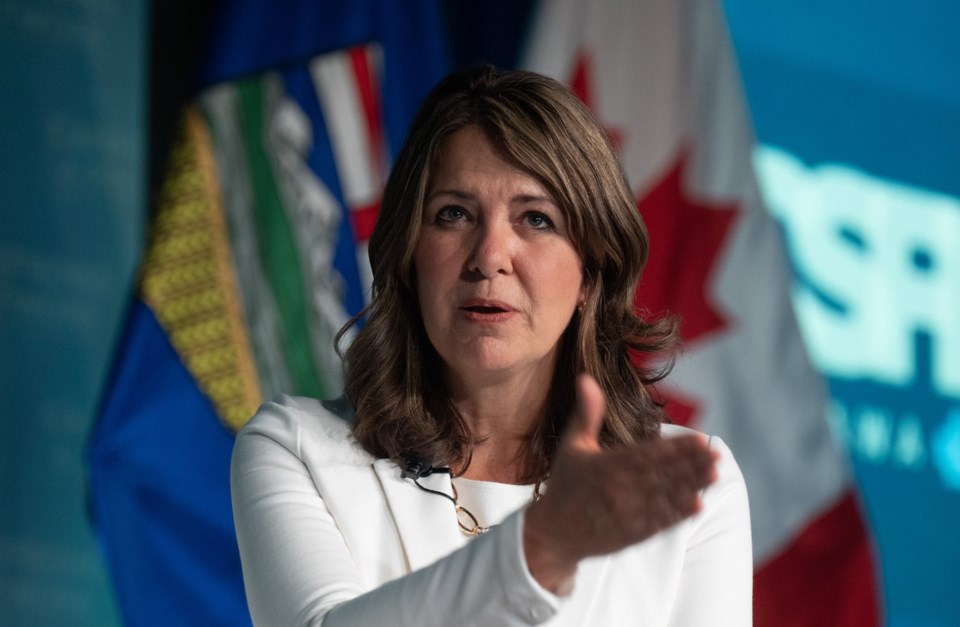EDMONTON — The idea of Alberta opting out of the Canada Pension Plan isn't moving ahead — at least for now.
Premier Danielle Smith says she won't be putting the creation of a provincial pension plan to a referendum any time soon.
"I'm not seeing that there's an appetite to put it to the people at the moment," Smith told reporters at an unrelated press conference Thursday.
"I have said that I would put it to the people if I saw evidence they wanted to vote on it (but) I'm not seeing that at the moment."
Smith said she thought the lack of appetite could be due, in part, to the lack of detail she said is available on how much the province would get from the national plan if it left.
In December, Canada's chief actuary published a report saying Alberta's perceived stake of the Canada Pension Plan's overall assets was substantially overestimated.
A government-commissioned report from 2023 estimated Alberta would be owed over 50 per cent of the national plan's assets, but in its own report the chief actuary pegged Alberta's share at a maximum of 25 per cent.
The actuary's report said Alberta's formula would leave some other provinces with a net negative allocation — an arrangement that would go against the wording of federal legislation.
The report agreed with a formula interpreted by University of Calgary economics professor Trevor Tombe, who told The Canadian Press in December that Alberta's share of the pot would be about $135 billion, not the $334-billion estimate Alberta's commissioned report came up with.
Smith said in December she was disappointed a clear answer on Alberta's share wasn't directly provided by the actuary and that she planned to follow up, but said Thursday there was no new information to report.
NDP Leader Naheed Nenshi told reporters he thinks Smith is keeping the idea of a provincial pension plan alive to appease some of her supporters, even though the premier is showing no interest in making it a reality.
"If the pension plan is dead ... why doesn't the premier just say it's dead?" Nenshi said.
"She's congenitally incapable of ever saying she was wrong, so instead she wastes her money, she picks meaningless fights instead of just saying 'I was wrong, the people have spoken, and I won't do this anymore.'"
Since becoming premier in 2022, Smith has argued Albertans have been getting a raw deal under the CPP.
Her United Conservative Party government spent $7.5 million on a public campaign touting the benefits of a provincial plan, including the possibility of lower contributions and higher payouts to retirees.
Creating a provincial pension plan was a recommendation put forward by the Fair Deal Panel struck by Smith's predecessor Jason Kenney shortly after he took office in 2019, citing the province's widespread frustration with the federal Liberal government.
In the lead-up to this week's federal election, Smith pledged to strike a second panel if Prime Minister Mark Carney's Liberals formed government again, saying such a panel would "listen to what it is that Albertans want to do in consequence."
Smith had also outlined a list of nine demands for the next prime minister, which included scrapping the greenhouse gas emissions cap but didn't include a deal on Alberta receiving a healthy share of the Canada Pension Plan assets.
Smith said Thursday that if her current read of Albertans' interest in a provincial pension plan is wrong, then the topic could be brought forward through a citizen-initiated petition calling for a referendum.
Her government tabled legislation Tuesday that substantially lowers the bar for such a referendum to occur, tasking citizens with collecting nearly 180,000 signatures rather than the previously required bar of roughly 600,000.
"If I'm misreading the public on that and they want to to have an actual vote, then that's another issue that can be put forward by citizen initiative," she said.
This report by The Canadian Press was first published May 1, 2025.
Jack Farrell, The Canadian Press



